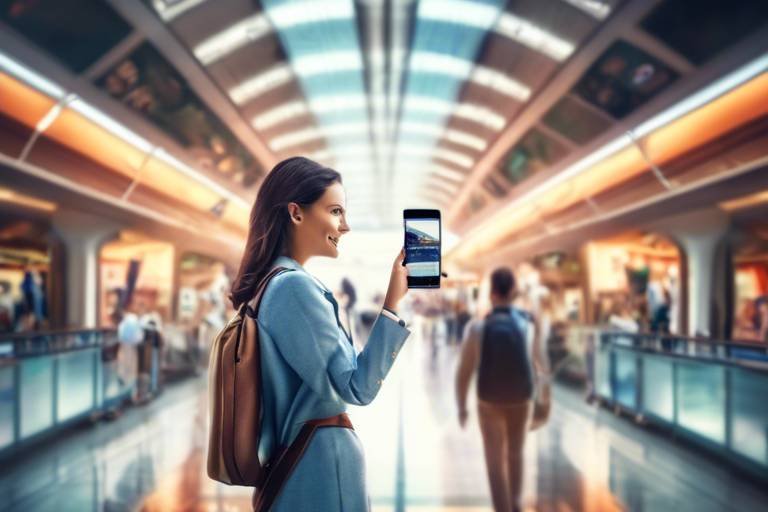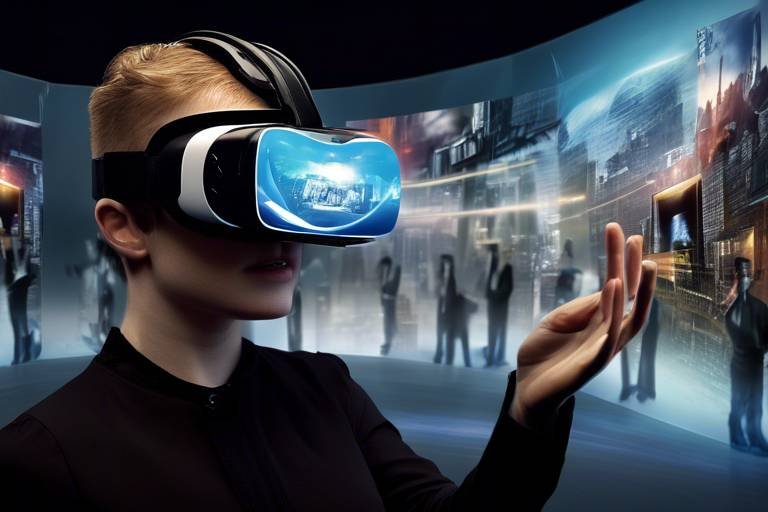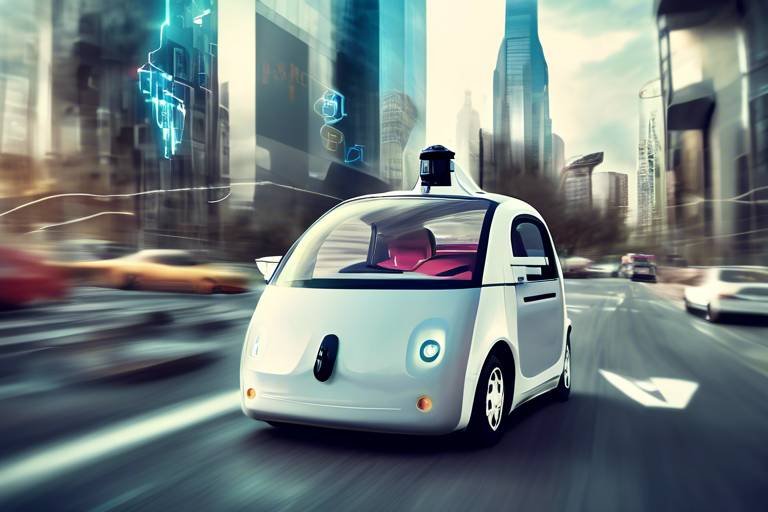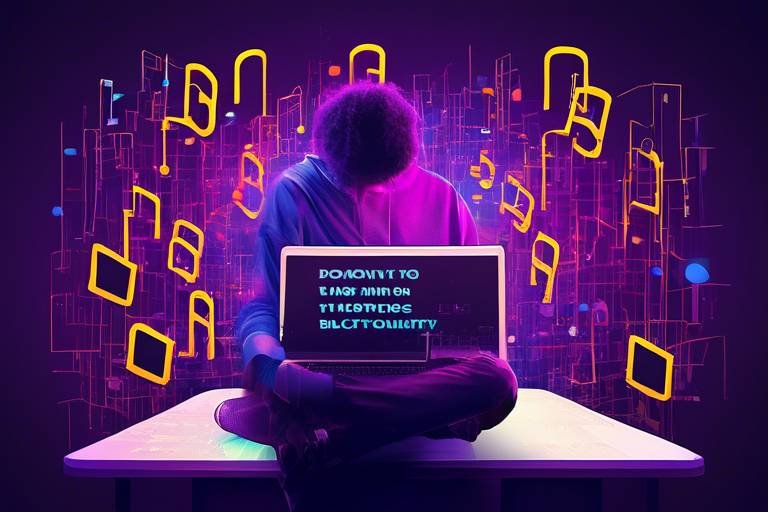How AI is Transforming the Travel Industry?
In today's fast-paced world, artificial intelligence (AI) is making waves across various sectors, and the travel industry is no exception. From the moment you start planning your trip to the time you return home, AI is there, working behind the scenes to enhance your experience. Imagine having a personal travel assistant that knows your preferences, suggests the best destinations, and even helps you navigate foreign lands with ease. That’s the magic of AI! It’s not just about making travel easier; it’s about creating memorable experiences tailored just for you.
AI is revolutionizing how we approach travel planning. Gone are the days of sifting through endless options and feeling overwhelmed. With AI-driven tools, travelers can enjoy personalized recommendations that align with their interests and past behaviors. Whether you’re a beach lover, an adventure seeker, or a culture enthusiast, AI can curate options that suit your unique taste, making the planning process not just efficient but also enjoyable.
Moreover, AI is enhancing customer service in the travel sector. Imagine having a friendly chatbot available 24/7, ready to assist you with any queries or issues. This is becoming a reality as travel companies adopt AI-powered chatbots. These virtual assistants don’t just provide instant support; they also reduce wait times and improve overall customer satisfaction. The best part? They’re always on duty, so whether you’re booking a last-minute flight at midnight or need help with a hotel reservation during your early morning coffee, assistance is just a message away.
As we dive deeper into the transformative effects of AI, it’s evident that the future of travel is bright. With the ability to analyze consumer behavior and market trends, AI helps travel companies implement dynamically priced solutions. This means that you can snag the best deals based on real-time data analysis, ensuring you get the most value for your money. Imagine booking a flight that adjusts its price based on demand while you’re browsing! This not only maximizes revenue for companies but also offers competitive rates for travelers.
Safety and security are paramount in travel, and AI is stepping up in this arena as well. From facial recognition at airports to predictive analytics for threat detection, AI technologies are enhancing safety protocols. Travelers can feel more secure knowing that AI is working diligently to keep them safe. Additionally, AI can assist in health monitoring, ensuring that travelers are informed about health regulations and safety measures, especially in a world still recovering from global health crises.
As we look to the future, the potential for AI in travel is limitless. Innovations such as virtual reality experiences are on the horizon, allowing travelers to explore destinations before they even book their tickets. This not only enhances excitement but also helps in making informed decisions. Furthermore, AI's predictive analytics capabilities will enable travel companies to stay ahead of emerging trends, ensuring they remain relevant in an ever-evolving market.
In conclusion, AI is not just a trend; it’s a powerful tool that is reshaping the travel industry. It’s enhancing customer experiences, streamlining operations, and paving the way for innovative solutions that make traveling easier and more enjoyable. So, the next time you plan a trip, remember that AI is there to make your journey unforgettable.
- How does AI improve travel planning? AI analyzes user preferences and past behaviors to provide personalized travel recommendations, making trip planning more efficient and enjoyable.
- What role do chatbots play in the travel industry? AI-powered chatbots offer instant support and information to travelers, enhancing customer satisfaction and reducing response times for queries.
- How does AI contribute to safety in travel? AI technologies enhance safety through facial recognition systems and predictive analytics for threat detection, ensuring safer travel experiences.
- What are dynamic pricing strategies? AI algorithms analyze market demand and consumer behavior to implement dynamic pricing, maximizing revenue while offering competitive rates.
- What future trends can we expect from AI in travel? Innovations like virtual reality experiences and predictive analytics for travel trends will further reshape how people travel and experience the world.

Personalized Travel Recommendations
In today's fast-paced world, where every second counts and choices abound, powered by AI are changing the game. Imagine planning a trip where every suggestion feels tailor-made just for you. That's the magic of artificial intelligence! By analyzing your past travel behaviors, preferences, and even social media interactions, AI algorithms can curate a list of destinations, accommodations, and activities that resonate with your interests.
For instance, if you frequently search for adventure sports or culinary experiences, AI can highlight destinations known for thrilling activities or renowned food scenes. This means no more sifting through countless options or feeling overwhelmed by choices. Instead, you receive a curated selection that speaks to your unique travel desires, making the planning process not just efficient but also enjoyable.
Furthermore, AI doesn't just stop at suggesting places. It can also provide insights into the best times to visit, local customs, and even hidden gems that you might not find in traditional travel guides. This level of personalization creates a more immersive experience, allowing travelers to connect with their destinations on a deeper level. It’s like having a personal travel assistant who knows you inside out!
To illustrate how effective these personalized recommendations can be, consider the following table:
| Traveler Profile | AI Recommendations |
|---|---|
| Adventure Seeker | Bungee jumping in New Zealand, hiking in the Swiss Alps, scuba diving in the Great Barrier Reef |
| Cultural Enthusiast | Exploring ancient ruins in Greece, attending a traditional tea ceremony in Japan, visiting art galleries in Paris |
| Food Lover | Street food tours in Bangkok, wine tasting in Napa Valley, cooking classes in Tuscany |
As you can see, the recommendations are not just generic; they are specifically designed to align with each traveler's profile. This level of customization is what sets AI apart in the travel industry. It’s like having a friend who knows exactly what you love, guiding you to experiences that will leave you with lasting memories.
Moreover, the beauty of AI lies in its ability to learn and adapt. The more you interact with these systems, the better they become at understanding your preferences. This continuous improvement means that your travel experiences will only get better over time. With AI, the days of cookie-cutter travel itineraries are long gone. Instead, we are entering an era where every journey can be an adventure crafted just for you.
So, whether you're dreaming of a serene beach getaway or an exhilarating city escape, AI is here to ensure that your travel planning is not just a task, but a delightful journey in itself. Say goodbye to the overwhelming choices and hello to a world of personalized travel experiences that await you!
- How does AI personalize travel recommendations? AI analyzes user data, including past travel history and preferences, to provide tailored suggestions.
- Can AI adapt to my changing preferences? Yes! AI systems learn from your interactions, continuously improving their recommendations based on your evolving interests.
- Are personalized travel recommendations more expensive? Not necessarily. Personalized recommendations can actually help you find better deals and experiences that fit your budget.

Smart Chatbots and Customer Service
In today's fast-paced world, customer service is more crucial than ever, especially in the travel industry. With travelers seeking instant support and information, AI-powered chatbots are stepping in to fill the gap. These smart digital assistants are not just a trend; they are revolutionizing how travel companies interact with their customers. Imagine planning your dream vacation and having a virtual assistant available 24/7, ready to answer your questions, provide recommendations, and resolve issues in real-time. Sounds like a dream, right? Well, it’s becoming a reality!
One of the most significant advantages of AI chatbots is their 24/7 availability. Unlike human agents, these chatbots never sleep, ensuring that travelers can get assistance at any hour of the day or night, regardless of their time zone. This constant availability leads to improved customer satisfaction and loyalty, as travelers feel supported and valued. For instance, if a traveler has an urgent question about their flight in the middle of the night, a chatbot can provide immediate answers, making the experience seamless and stress-free.
Moreover, the implementation of chatbots can lead to cost-effective solutions for travel businesses. By automating routine inquiries and support tasks, companies can significantly reduce their operational costs. Instead of hiring a large team of customer service representatives, they can rely on AI to handle a substantial volume of queries. This not only saves money but also ensures that human agents can focus on more complex issues that require a personal touch. The result? A more efficient service model that enhances the overall customer experience.
Another remarkable feature of AI chatbots is their ability to provide language translation services. In a global industry like travel, communication can often be a barrier. However, with AI-driven translation tools, travelers can interact with service providers in their preferred language, breaking down those barriers. This capability not only enhances the travel experience but also opens up new markets for travel companies, allowing them to cater to a more diverse clientele.
Furthermore, AI chatbots excel in feedback analysis and improvement. By efficiently analyzing customer interactions and feedback, these systems can identify trends and areas needing improvement. For example, if multiple travelers express dissatisfaction with a particular service, AI can flag this issue for the company to address promptly. This proactive approach helps businesses adapt their offerings to better meet customer expectations, ultimately leading to increased satisfaction and loyalty.
In conclusion, the integration of smart chatbots in the travel industry is not just a convenience; it’s a game-changer. By providing instant support, reducing costs, facilitating communication, and enhancing feedback mechanisms, AI chatbots are setting new standards for customer service. As we move forward, it’s clear that these intelligent assistants will continue to play a pivotal role in shaping the future of travel.
- What are AI chatbots? AI chatbots are automated programs that use artificial intelligence to simulate conversation with users, providing instant responses to inquiries.
- How do chatbots improve customer service? They offer 24/7 availability, reduce wait times, and can handle multiple inquiries simultaneously, enhancing the overall customer experience.
- Can chatbots understand different languages? Yes, many AI chatbots are equipped with language translation capabilities, allowing them to communicate with travelers in various languages.
- Are chatbots cost-effective for travel companies? Absolutely! By automating routine tasks, chatbots help reduce operational costs while maintaining high service quality.

24/7 Availability
In today's fast-paced world, travelers demand immediate assistance, regardless of the time of day. Imagine planning a spontaneous trip at midnight or needing urgent help while navigating a foreign country. This is where AI-powered chatbots come into play, offering round-the-clock availability that transforms the way travel companies interact with their customers. With these intelligent systems, help is just a message away, no matter if it's day or night.
AI chatbots are designed to handle a multitude of inquiries simultaneously, ensuring that every traveler receives prompt responses to their questions. This capability not only enhances customer satisfaction but also fosters loyalty. When travelers know they can reach out for help at any hour, it builds a sense of trust and reliability in the travel brand. Imagine a traveler stuck in an airport at 3 AM; a quick chat with a responsive AI can make all the difference in alleviating stress and providing valuable information.
Furthermore, the implementation of AI chatbots allows travel companies to allocate their human resources more effectively. With chatbots managing routine inquiries, human agents can focus on more complex issues that require a personal touch. This not only improves operational efficiency but also enhances the overall customer experience. As a result, companies can maintain high-quality service while significantly reducing response times.
To illustrate the impact of 24/7 availability, consider the following table that outlines the benefits:
| Benefit | Description |
|---|---|
| Instant Support | Travelers receive immediate responses to their inquiries, enhancing satisfaction. |
| Increased Efficiency | Chatbots handle multiple requests simultaneously, freeing up human agents for complex issues. |
| Improved Customer Loyalty | Providing help at any time builds trust and encourages repeat business. |
| Cost Savings | Reducing the need for extensive human customer support teams lowers operational costs. |
In summary, the 24/7 availability of AI chatbots is a game-changer in the travel industry. It not only meets the demands of modern travelers but also streamlines operations for travel companies. As we continue to embrace technology, the travel experience will only become more efficient, enjoyable, and accessible to everyone, regardless of where they are or what time it is.
- What are AI chatbots? AI chatbots are automated systems that use artificial intelligence to interact with users and provide assistance.
- How do AI chatbots improve customer service? They offer instant responses to inquiries, operate 24/7, and can manage multiple requests at once.
- Can I trust AI chatbots for sensitive information? Yes, reputable travel companies implement security measures to protect customer data during interactions.
- Are AI chatbots replacing human customer service agents? Not entirely; they handle routine inquiries, allowing human agents to focus on more complex issues.

Cost-Effective Solutions
In the fast-paced world of travel, every penny counts. That's where AI chatbots come into play, acting as a game changer for travel companies looking to streamline their operations and cut costs. By automating customer interactions, these intelligent systems can handle a multitude of inquiries simultaneously, reducing the need for large customer support teams. Imagine a bustling airport where every traveler has questions about their flight status, baggage claims, or local attractions. Instead of a long line of frustrated customers waiting for assistance, an AI chatbot can provide instant answers, freeing up human agents to handle more complex issues.
Furthermore, the implementation of AI chatbots can lead to significant savings in operational expenses. Consider the following cost-saving benefits:
- Reduced Staffing Costs: With chatbots managing routine inquiries, companies can operate with fewer customer service representatives.
- Increased Efficiency: AI can respond to customer queries at any hour, ensuring that no time is wasted waiting for human responses.
- Lower Training Costs: Training new staff can be expensive; AI chatbots require minimal ongoing training, as they continuously learn from interactions.
Moreover, the scalability of AI solutions means that as a travel company grows, the chatbot can easily adapt to handle increased demand without a proportional increase in costs. This scalability is crucial in a fluctuating industry where demand can spike during peak travel seasons. For instance, during holidays or special events, the volume of inquiries can skyrocket, but a well-implemented AI system can manage this surge effortlessly.
In essence, the cost-effective solutions offered by AI are not just about saving money; they also enhance the overall customer experience. By providing quick and accurate responses, travel companies can improve customer satisfaction, which in turn leads to increased loyalty and repeat business. As companies continue to embrace AI technology, they are not just cutting costs—they are also investing in a more efficient and customer-friendly future.
Q1: How do AI chatbots improve customer service in the travel industry?
A1: AI chatbots provide instant support and information to travelers, allowing them to get answers to their queries 24/7, which enhances satisfaction and reduces response times.
Q2: Can AI chatbots handle multiple languages?
A2: Yes, many AI chatbots are equipped with language translation capabilities, enabling seamless communication between travelers and service providers, regardless of language barriers.
Q3: What are the long-term benefits of implementing AI in travel businesses?
A3: Long-term benefits include reduced operational costs, improved customer satisfaction, enhanced efficiency, and the ability to scale operations without a corresponding increase in expenses.
Q4: Will AI replace human customer service agents?
A4: While AI can handle routine inquiries, human agents are still essential for addressing complex issues and providing a personal touch, ensuring a balanced approach to customer service.

Language Translation Services
In today's interconnected world, language should never be a barrier to travel. With the advent of AI-driven translation services, travelers can communicate effortlessly, regardless of the languages spoken at their destinations. Imagine stepping into a bustling marketplace in Tokyo and being able to converse with vendors in real-time, all thanks to your smartphone translating your words into Japanese and vice versa. This is not just a fantasy; it’s a reality made possible by artificial intelligence.
AI translation tools, such as Google Translate and various mobile applications, utilize sophisticated algorithms that analyze and convert text or speech from one language to another almost instantaneously. These tools are designed to understand context, slang, and even regional dialects, making conversations smoother and more natural. For instance, when a traveler asks for directions in a foreign city, AI can help translate the question and the response, ensuring that the traveler receives accurate guidance without the frustration of misunderstandings.
Moreover, AI translation services are not limited to just verbal communication. They also extend to written content, such as menus, brochures, and travel itineraries. This means that travelers can enjoy local cuisines without the anxiety of misordering due to language barriers. Imagine savoring a delicious dish in a quaint Italian restaurant, knowing exactly what you’re eating thanks to a translated menu that accurately conveys all the flavors and ingredients.
The benefits of these AI-driven translation tools are vast:
- Enhanced Communication: Travelers can engage with locals, ask questions, and immerse themselves in different cultures.
- Improved Safety: Understanding emergency instructions or local laws becomes easier, ensuring safer travel experiences.
- Increased Accessibility: These services make travel more inclusive for individuals who may not speak the local language.
As we look to the future, the potential of AI in translation services is immense. With advancements in neural networks and machine learning, we can expect even more accurate translations that capture the nuances of human language. This ongoing evolution will further enhance the travel experience, allowing for deeper connections between travelers and locals. The world is becoming a smaller place, and AI is leading the charge in breaking down language barriers, making travel not just easier, but also more enriching.
In conclusion, AI-powered language translation services are revolutionizing how we travel. They empower travelers to explore new cultures without fear and facilitate meaningful interactions that enrich their journeys. As we embrace this technology, we can look forward to a future where every traveler can feel at home, no matter where they roam.
- How accurate are AI translation services?
AI translation services have improved significantly, often providing accurate translations for common phrases and conversations. However, they may still struggle with idiomatic expressions or complex texts.
- Can I use AI translation services offline?
Many translation apps offer offline capabilities, allowing users to download language packs for use without an internet connection, making them convenient for travel.
- Are AI translation tools free to use?
Several AI translation tools are available for free, while others may offer premium features for a fee. It's best to explore different options to find one that suits your needs.

Feedback Analysis and Improvement
In today's fast-paced travel industry, understanding customer feedback is more crucial than ever. With the advent of artificial intelligence, travel companies can harness the power of data to gain insights into customer experiences. AI systems can efficiently analyze vast amounts of feedback from various sources, including social media, review platforms, and direct customer surveys. This capability allows businesses to identify trends and patterns that might otherwise go unnoticed.
Imagine a travel agency that receives hundreds of reviews each day. Sifting through this data manually would be like searching for a needle in a haystack. However, with AI, these companies can quickly pinpoint common complaints or praises, allowing them to address issues proactively. For instance, if multiple customers mention a delay in check-in times at a particular hotel, the agency can investigate and resolve the problem before it escalates.
Moreover, AI-driven feedback analysis enables travel companies to enhance their offerings continuously. By understanding what customers love or dislike, they can tailor their services to meet evolving expectations. This can lead to:
- Improved Customer Satisfaction: By acting on feedback, companies can create a more enjoyable travel experience, leading to higher satisfaction rates.
- Increased Loyalty: When customers see that their opinions matter, they are more likely to return for future travel needs.
- Better Marketing Strategies: Insights gained from feedback can inform targeted marketing campaigns, ensuring that they resonate with the audience.
To illustrate the impact of AI in feedback analysis, consider the following table that outlines the process:
| Step | Description | AI's Role |
|---|---|---|
| 1. Data Collection | Gathering feedback from multiple channels. | AI systems automate data collection, ensuring no feedback is overlooked. |
| 2. Sentiment Analysis | Understanding the emotions behind the feedback. | AI algorithms analyze language to determine positive, negative, or neutral sentiments. |
| 3. Trend Identification | Spotting recurring themes in feedback. | AI identifies patterns and trends, highlighting areas needing attention. |
| 4. Actionable Insights | Providing recommendations for improvement. | AI generates insights that guide strategic decisions for service enhancement. |
In conclusion, AI's role in feedback analysis is transformative. It not only streamlines the process of gathering and interpreting customer feedback but also empowers travel companies to make informed decisions that enhance the overall travel experience. By leveraging these insights, businesses can stay ahead of the curve, ensuring they meet and exceed customer expectations in an ever-competitive market.
- How does AI improve feedback analysis?
AI analyzes large volumes of data quickly, identifying trends and sentiments that help companies understand customer preferences better. - Can AI predict future customer needs based on feedback?
Yes, AI can recognize patterns in feedback that suggest emerging trends, allowing companies to adapt their services accordingly. - Is customer feedback analysis expensive with AI?
While there may be initial costs for AI implementation, the long-term benefits, including improved customer satisfaction and loyalty, often outweigh these expenses.

Dynamic Pricing Strategies
In today's fast-paced travel industry, have emerged as a game-changer for both companies and consumers. Imagine walking into a store where the price of your favorite gadget changes based on demand, time of day, or even your shopping history. That's exactly what dynamic pricing does in the travel sector! By leveraging AI algorithms, travel companies can adjust their prices in real-time, responding swiftly to market conditions, competitor pricing, and consumer behavior.
So, how does this all work? At its core, dynamic pricing involves a continuous analysis of various factors that influence pricing decisions. These factors can include:
- Market Demand: High demand for flights or hotel rooms can trigger price increases, while lower demand may lead to discounts.
- Competitor Pricing: Keeping an eye on what competitors are charging allows companies to stay competitive and adjust their rates accordingly.
- Consumer Behavior: Analyzing past booking patterns helps predict when customers are likely to book and at what price points.
One of the most exciting aspects of dynamic pricing is its ability to maximize revenue while still offering competitive rates. For instance, during peak travel seasons, airlines can increase prices as demand surges. Conversely, during off-peak times, they might drop prices to attract more customers. This flexibility not only benefits the companies but also enhances the customer experience by providing them with better deals when they need them most.
To illustrate this concept further, consider the following table that outlines how dynamic pricing can affect a travel company's revenue:
| Scenario | Price Adjustment | Expected Revenue Impact |
|---|---|---|
| High Demand (Summer Holidays) | Increase by 20% | Increase in revenue due to higher ticket sales |
| Low Demand (Post-Holiday Season) | Decrease by 15% | Attracts more customers, potentially increasing overall sales |
As travelers become more savvy and aware of pricing trends, the demand for transparency is also on the rise. Customers are increasingly looking for the best deals, and dynamic pricing allows companies to provide just that. By utilizing AI-driven insights, travel companies can inform customers about potential price changes, creating a sense of urgency that encourages bookings. This strategy not only boosts sales but also enhances customer satisfaction as they feel they are getting the best value for their money.
In conclusion, dynamic pricing strategies are revolutionizing how travel companies operate. They provide the tools necessary for real-time decision-making, allowing businesses to remain competitive in a crowded marketplace. As AI technology continues to evolve, we can expect even more sophisticated pricing models that will further enhance the travel experience for consumers. So, the next time you book a flight or a hotel, remember that the price you see may just be the tip of the iceberg in a complex, dynamic pricing strategy!
- What is dynamic pricing? Dynamic pricing is a flexible pricing strategy where prices are adjusted in real-time based on market demand, competitor pricing, and consumer behavior.
- How does AI influence dynamic pricing? AI algorithms analyze vast amounts of data to help companies make informed pricing decisions, maximizing revenue while providing competitive rates to customers.
- Is dynamic pricing beneficial for consumers? Yes, dynamic pricing can benefit consumers by providing better deals during off-peak times and offering competitive rates based on market conditions.

Real-Time Market Analysis
In today's fast-paced travel industry, has become a game-changer. Imagine trying to catch a wave at the beach, but you're always a step behind the tide. That’s what it’s like for travel companies that don’t leverage AI tools for market insights. With AI, businesses can continuously monitor market trends, fluctuations, and consumer preferences, allowing them to make informed decisions that keep them ahead of the competition.
AI tools collect and analyze vast amounts of data from various sources, including social media, booking platforms, and competitor pricing. This data is processed in real-time, enabling travel companies to respond swiftly to changes in the market. For instance, if a competitor drops their prices, an AI system can alert the company to adjust their rates accordingly. This kind of agility is crucial in a landscape where consumer expectations are constantly evolving.
Moreover, real-time market analysis provides insights into customer sentiment. By analyzing reviews, social media mentions, and customer feedback, AI can gauge how travelers feel about certain destinations or services. This information is invaluable for tailoring marketing strategies and improving offerings. For example, if travelers express dissatisfaction with a particular hotel, the company can take immediate action to address the issue, enhancing customer satisfaction and loyalty.
To illustrate the impact of real-time market analysis, consider the following table that highlights key benefits:
| Benefit | Description |
|---|---|
| Agility | Quickly respond to market changes and competitor actions. |
| Customer Insights | Understand traveler sentiment and preferences in real-time. |
| Optimized Pricing | Adjust prices dynamically based on market demand and competition. |
| Enhanced Marketing | Tailor marketing strategies to current trends and consumer behavior. |
In summary, real-time market analysis powered by AI is not just a luxury; it's a necessity for travel companies aiming to thrive in an increasingly competitive environment. By harnessing the power of data, businesses can make smarter decisions, enhance customer experiences, and ultimately drive growth.
- What is real-time market analysis? Real-time market analysis refers to the continuous monitoring and assessment of market trends and consumer behavior, enabling businesses to make informed decisions quickly.
- How does AI contribute to market analysis? AI analyzes large datasets from various sources in real-time, providing insights that help companies adapt to market changes and consumer preferences.
- Why is real-time analysis important for the travel industry? It allows travel companies to stay competitive by responding quickly to market fluctuations, optimizing pricing, and enhancing customer satisfaction.

Consumer Behavior Prediction
Understanding consumer behavior is like trying to read the mind of a wanderlust-filled traveler. With the help of artificial intelligence (AI), travel companies are now able to predict what travelers might want even before they realize it themselves. Imagine having a personal travel assistant that knows your preferences, budget, and even your past travel history, guiding you towards your next adventure! This is the magic of AI in action.
AI algorithms analyze vast amounts of data, including search history, booking patterns, and social media interactions. By identifying trends and patterns, these systems can forecast what types of trips or experiences are likely to appeal to different segments of travelers. For instance, if a user frequently searches for beach vacations, AI can suggest similar destinations or activities that align with their interests. This level of personalization not only enhances the user experience but also increases the likelihood of bookings.
Moreover, AI's predictive capabilities can help travel companies tailor their marketing strategies. By understanding when consumers are most likely to book a trip, businesses can time their promotions effectively. For example, if data shows that families tend to book vacations during school holidays, travel agencies can launch targeted campaigns right before these periods to capture their attention. This proactive approach enables companies to stay ahead of the competition and maximize their marketing efforts.
Additionally, AI can segment consumers based on their behavior, allowing travel companies to create targeted offers. Here’s a quick look at how this segmentation might work:
| Consumer Segment | Behavior Characteristics | Recommended Offers |
|---|---|---|
| Adventure Seekers | Frequent searches for hiking, trekking, and outdoor activities | Discounts on adventure tours and gear rentals |
| Luxury Travelers | Interest in high-end accommodations and exclusive experiences | Packages for luxury resorts and VIP services |
| Budget Travelers | Looking for deals, last-minute offers, and budget-friendly options | Last-minute deals and budget travel packages |
By leveraging these insights, travel companies can not only enhance customer satisfaction but also boost their bottom line. The result? A win-win situation where travelers receive tailored experiences that resonate with their desires, while businesses enjoy increased loyalty and repeat bookings.
As we move forward, the importance of AI in predicting consumer behavior will only grow. With advancements in technology, we can expect even more sophisticated algorithms that will refine these predictions, making travel planning an even more seamless and enjoyable experience. So, whether you're dreaming of a tropical getaway or a cultural expedition, rest assured that AI is working behind the scenes to make your travel dreams a reality!
- What is consumer behavior prediction in travel? It's the use of AI to analyze data and forecast what travelers might want or need based on their past behaviors and preferences.
- How does AI enhance the travel experience? AI provides personalized recommendations, optimizes marketing strategies, and helps in creating tailored travel packages.
- Can AI predict travel trends? Yes, AI can analyze market data to forecast emerging travel trends, allowing companies to adapt their offerings accordingly.

Enhancing Safety and Security
In today's world, safety and security are paramount concerns for travelers. With the rise of technology, the travel industry is leveraging artificial intelligence (AI) to enhance safety measures and provide a secure environment for all. From airports to hotels, AI technologies are being implemented to create a safer travel experience, ensuring that travelers can focus on enjoying their journeys rather than worrying about potential risks.
One of the most significant advancements in this area is the use of facial recognition systems. Airports worldwide are adopting these systems to streamline passenger flow while enhancing security protocols. By using AI to analyze facial features, these systems can quickly identify individuals, allowing for faster check-ins and security screenings. This not only improves efficiency but also helps in identifying potential threats before they escalate.
Moreover, AI plays a crucial role in predictive analytics for threat detection. By analyzing vast amounts of data from various sources, AI systems can identify patterns that may indicate a security risk. For instance, if there’s an unusual spike in flight cancellations or changes in passenger behavior, AI can alert security personnel to investigate further. This proactive approach significantly reduces the chances of incidents occurring.
In addition to physical security, AI is also enhancing fraud detection measures in online transactions. With the increase in digital bookings, the risk of fraud has grown. AI systems can monitor transactions in real-time, identifying suspicious activities and flagging them for further investigation. This not only protects the financial interests of both travelers and travel companies but also builds trust in online platforms.
Another critical aspect of safety in travel is health monitoring. In light of recent global health crises, AI technologies are now being utilized to monitor health protocols and ensure compliance with safety regulations. For example, AI can track health data and provide travelers with up-to-date information regarding health regulations in different destinations. This helps travelers make informed decisions about their journeys and ensures they adhere to necessary guidelines.
To summarize, the integration of AI in the travel industry is revolutionizing how safety and security are approached. By implementing advanced technologies such as facial recognition, predictive analytics, and real-time fraud detection, the industry is not only enhancing the travel experience but also ensuring that travelers feel secure every step of the way. As we move forward, we can expect even more innovative solutions that will further safeguard our journeys.
- How does AI improve airport security?
AI enhances airport security through facial recognition systems and predictive analytics, allowing for quicker identification of passengers and potential threats. - Can AI help in detecting fraudulent transactions?
Yes, AI can monitor transactions in real-time to identify suspicious activities, thereby reducing the risk of fraud in online bookings. - What role does AI play in health monitoring for travelers?
AI assists in tracking health data and ensuring compliance with safety regulations, providing travelers with important health information relevant to their destinations.

Fraud Detection
In the fast-paced world of travel, where transactions occur at lightning speed, has become a critical component for ensuring the safety and security of both travelers and travel companies. With the rise of online bookings and digital transactions, the travel industry has become a prime target for fraudulent activities. However, the integration of artificial intelligence (AI) is proving to be a game-changer in combating these threats.
AI systems are designed to analyze vast amounts of data in real-time, identifying suspicious patterns and behaviors that could indicate fraudulent activities. For instance, when a customer books a flight, the AI can assess various factors such as the user's location, the payment method, and the booking history. If any anomalies are detected—like a sudden booking from a different country or an unusual payment method—the system can flag the transaction for further review.
Moreover, AI's ability to learn from historical data enhances its fraud detection capabilities. As it processes more transactions, it becomes better at recognizing what constitutes normal behavior versus what might be considered suspicious. This continuous learning process allows travel companies to stay one step ahead of fraudsters, significantly reducing the risk of financial loss.
Some of the key features of AI-driven fraud detection systems include:
- Real-time Monitoring: AI can monitor transactions as they happen, allowing for immediate action if fraud is suspected.
- Behavioral Analysis: By analyzing user behavior, AI can identify deviations that may indicate fraudulent activity.
- Automated Alerts: The system can automatically alert human operators when a potential fraud case is detected, speeding up response times.
As we delve deeper into the digital age, the importance of AI in fraud detection will only grow. Travel companies that adopt these technologies not only protect their bottom line but also bolster customer trust. After all, when travelers feel secure in their transactions, they are more likely to book their adventures without hesitation.
- How does AI detect fraud in travel transactions?
AI analyzes transaction patterns and user behavior to identify anomalies that may suggest fraudulent activities. - Can AI prevent all types of fraud?
While AI significantly reduces the risk of fraud, it cannot guarantee complete prevention. Continuous monitoring and updates are essential. - What are the benefits of using AI for fraud detection?
Benefits include real-time monitoring, reduced response times, and enhanced customer trust, leading to improved overall satisfaction.

Health Monitoring
In today's world, where health and safety are at the forefront of travel considerations, AI technologies are stepping up to the plate, playing an essential role in health monitoring for travelers. Imagine stepping off a plane and being instantly informed about the latest health regulations of your destination—this is becoming a reality thanks to AI. With the ongoing global health concerns, travel companies are leveraging artificial intelligence to ensure travelers are well-informed and safe.
AI systems can monitor and analyze health data in real-time, providing crucial information that helps travelers navigate health protocols effectively. For instance, when planning a trip, a traveler can receive notifications about vaccination requirements, COVID-19 testing protocols, and even local health advisories—all tailored to their itinerary. This not only enhances the travel experience but also ensures that travelers are prepared and compliant with safety measures.
Moreover, AI can facilitate contact tracing and health monitoring during the trip itself. With the integration of mobile apps, travelers can report their health status, receive alerts about potential exposure to illnesses, and access emergency health services if needed. This proactive approach not only enhances the sense of security but also builds trust between travelers and service providers.
To illustrate the impact of AI in health monitoring, consider the following table showcasing the key features and benefits:
| Feature | Benefit |
|---|---|
| Real-Time Health Updates | Travelers receive immediate information on health regulations and advisories. |
| Personal Health Tracking | Travelers can monitor their health status and receive alerts about potential health risks. |
| Emergency Support | Quick access to medical assistance and emergency services while traveling. |
| Data Privacy | AI ensures that personal health information is securely managed and protected. |
As the travel industry continues to adapt to the post-pandemic world, the role of AI in health monitoring will only grow. Travelers can expect a more seamless experience where their health needs are prioritized, allowing them to focus on what truly matters—enjoying their journey. With the right tools at their disposal, travelers can traverse the globe with confidence, knowing that their health is being monitored and managed effectively.
- How does AI help in monitoring traveler health? AI analyzes real-time health data and provides travelers with important health updates and alerts during their trips.
- Can AI provide emergency health support while traveling? Yes, AI can facilitate quick access to emergency medical services and support, ensuring travelers receive timely assistance.
- Is my personal health data safe when using AI travel apps? Reputable AI systems prioritize data privacy and implement strong security measures to protect user information.

Streamlined Operations and Logistics
In the fast-paced world of travel, efficiency is key. Artificial Intelligence (AI) is stepping in to revolutionize operations and logistics within the travel industry, ensuring that everything runs smoothly from the moment a traveler books their trip to when they return home. By automating various processes, AI not only saves time but also enhances the overall customer experience.
One of the most significant advancements AI brings to the table is the introduction of automated booking systems. These systems allow travelers to make reservations quickly and accurately, minimizing the chances of human error. Imagine this: you’re planning a vacation and after a few clicks, your flight and hotel are booked without any hassle. This seamless process is not just a dream; it’s becoming a reality thanks to AI. These systems can handle various requests simultaneously, ensuring that customers don’t have to wait in long queues or deal with frustrating delays.
Moreover, AI-driven systems are capable of learning from past bookings and customer preferences. This means that they can suggest personalized options based on individual tastes, making the entire booking experience more enjoyable. For example, if you frequently book beach vacations, the system might prioritize seaside hotels or activities that align with your interests, making it feel like the service truly understands you.
Another area where AI shines is in supply chain management. Travel companies are now utilizing AI technologies to optimize their inventory control and demand forecasting. This means that airlines, hotels, and travel agencies can predict the number of bookings they will receive during peak seasons and adjust their resources accordingly. For instance, if an airline anticipates a surge in demand for a specific route, it can proactively add more flights or adjust pricing strategies to maximize revenue.
In addition, AI helps in resource allocation. By analyzing real-time data, travel companies can ensure that they have the right amount of staff and resources in place to meet customer demands. This not only enhances service delivery but also boosts customer satisfaction. Imagine arriving at a hotel where the staff is ready and waiting for you because they knew you were coming. That’s the kind of personalized service that AI can facilitate.
Furthermore, AI can assist in logistics management by automating routine tasks such as scheduling and route optimization. For example, delivery services that transport luggage or supplies can use AI to determine the most efficient routes, saving time and reducing operational costs. This optimization is crucial, especially in an industry where every minute counts and delays can lead to unhappy customers.
As we look to the future, the integration of AI in travel operations is likely to expand even further. The possibilities are endless, and as technology continues to evolve, we can expect to see even more innovative solutions that will make traveling not only easier but also more enjoyable. The travel industry is on the brink of a transformation, and AI is leading the charge.
- How is AI improving the travel booking process? AI automates the booking process, reduces human error, and provides personalized recommendations based on user preferences.
- What role does AI play in supply chain management in travel? AI helps in demand forecasting and resource allocation, ensuring that travel companies can meet customer demands efficiently.
- Can AI enhance customer satisfaction in travel? Yes, by streamlining operations and providing personalized experiences, AI significantly boosts customer satisfaction levels.
- What are the future trends of AI in the travel industry? Future trends include more advanced predictive analytics, improved resource management, and enhanced customer service solutions.

Automated Booking Systems
In today's fast-paced world, are revolutionizing the way travelers secure their trips. Imagine waking up in the morning, sipping your coffee, and effortlessly booking a flight to your dream destination—all without the hassle of long phone calls or tedious forms. That's the magic of AI-driven booking systems! They not only streamline the reservation process but also enhance the overall customer experience in ways we never thought possible.
These systems utilize advanced algorithms to process bookings in real-time, ensuring that travelers receive instant confirmations and updates. For instance, when you search for a flight, the system swiftly scans multiple airlines, comparing prices and availability, to present you with the best options in a matter of seconds. This kind of efficiency is akin to having a personal travel assistant who works tirelessly around the clock, making your travel planning a breeze.
Moreover, automated booking systems reduce the likelihood of human error. Traditional booking methods often involve manual entries, which can lead to mistakes that might ruin your travel plans. With AI, the chances of double bookings or incorrect details are significantly minimized. Here are some key benefits of automated booking systems:
- Speed: Instant bookings and confirmations.
- Accuracy: Reduced errors and improved reliability.
- Convenience: 24/7 access to booking services from anywhere in the world.
- Cost-Effectiveness: Competitive pricing due to real-time market analysis.
As we look towards the future, the integration of AI in automated booking systems is expected to deepen. Imagine a scenario where the system not only books your flight but also suggests the best times to travel based on weather patterns, local events, and even your personal preferences. This level of customization and foresight will not only save time but also enhance the overall travel experience, making it more enjoyable and tailored to individual needs.
In conclusion, automated booking systems are not just a trend; they are a fundamental shift in how we approach travel planning. They offer convenience, accuracy, and efficiency, transforming a once tedious process into an exciting journey from the very first click. With each advancement in AI technology, we can only anticipate even more innovative solutions that will further simplify our travel experiences and open up a world of possibilities.
- What is an automated booking system?
An automated booking system is a software solution that allows travelers to book flights, hotels, and other travel services online without human intervention. - How do automated booking systems enhance customer experience?
They provide instant confirmations, reduce errors, and allow travelers to book services at any time, making the process faster and more efficient. - Can I trust the prices shown by automated booking systems?
Yes, these systems often perform real-time market analysis to provide competitive pricing based on current demand and availability. - Will automated booking systems replace travel agents?
While they offer many advantages, travel agents still provide personalized service and expertise that automated systems cannot fully replicate.

Supply Chain Management
In the fast-paced world of travel, effective supply chain management is crucial for ensuring that services run smoothly and customers remain satisfied. AI technologies are stepping in as game changers, optimizing various aspects of supply chain processes. Imagine a finely tuned orchestra where every musician knows their part and plays in harmony; that's how AI can streamline the travel supply chain. By leveraging advanced algorithms and data analytics, travel companies can gain real-time insights into inventory levels, demand forecasts, and resource allocation.
One of the most significant advantages of AI in supply chain management is its ability to enhance inventory control. For instance, hotels can predict peak seasons and adjust their room availability accordingly, while airlines can manage their fleet more efficiently by anticipating passenger loads. This not only reduces costs but also ensures that resources are utilized effectively. With AI, companies can analyze historical data and current trends to make informed decisions about stock levels, preventing both overstocking and stockouts.
Furthermore, AI can improve demand forecasting, which is essential for travel agencies and service providers to plan their offerings. By examining factors such as seasonality, economic conditions, and even social media trends, AI can help predict how many travelers will be interested in a particular destination or service. This predictive capability allows companies to tailor their marketing strategies and promotional efforts accordingly, ensuring that they meet customer needs while maximizing profits.
To illustrate the impact of AI on supply chain management, consider the following table that highlights key benefits:
| Benefit | Description |
|---|---|
| Improved Inventory Control | AI helps maintain optimal stock levels, reducing waste and ensuring availability. |
| Enhanced Demand Forecasting | Predictive analytics provide insights into future travel trends, allowing for better planning. |
| Resource Allocation | AI optimizes the distribution of resources, ensuring efficiency in service delivery. |
| Cost Reduction | By streamlining operations, AI reduces operational costs, benefiting both companies and customers. |
In summary, the infusion of AI into supply chain management not only enhances operational efficiency but also elevates the overall customer experience in the travel industry. As companies continue to adopt these technologies, they will be better equipped to navigate the complexities of the travel landscape, ensuring that they remain competitive and responsive to the ever-changing demands of travelers.
- What is supply chain management in the travel industry?
Supply chain management involves overseeing the flow of goods and services, from the initial planning stages to the final delivery to customers. In the travel industry, this includes managing everything from hotel bookings to flight schedules. - How does AI improve inventory control?
AI enhances inventory control by analyzing data to predict demand, allowing companies to maintain optimal stock levels and reduce waste. - Can AI help with demand forecasting?
Yes, AI can analyze historical data and current trends to predict future demand for travel services, enabling companies to tailor their offerings accordingly. - What are the cost benefits of using AI in supply chain management?
By streamlining operations and improving efficiency, AI can significantly reduce operational costs, benefiting both companies and customers.

Future Trends in AI and Travel
As we look ahead, the travel industry is on the brink of a significant transformation, driven by the continuous evolution of artificial intelligence. The integration of AI technologies is not just a trend; it's a revolution that promises to reshape how we explore the world. One of the most exciting prospects is the fusion of AI with virtual reality (VR). Imagine being able to step into a virtual environment that simulates your dream destination. This technology will allow potential travelers to experience the sights and sounds of a place before they even book a ticket. It's like trying on a pair of shoes before buying them—immersive, engaging, and incredibly informative.
Moreover, AI's predictive analytics capabilities are set to enhance how travel companies operate. By analyzing vast amounts of data, AI can forecast emerging travel trends and consumer preferences. This means that travel agencies can tailor their offerings to meet the ever-changing demands of travelers. For instance, if AI detects a surge in interest for eco-friendly travel options, companies can quickly adapt their marketing strategies and packages to cater to this growing market. It’s akin to having a crystal ball that reveals what travelers will want next.
In addition, the rise of personalized travel experiences through AI will become increasingly prominent. Picture a scenario where your travel itinerary is crafted just for you, taking into account your interests, past trips, and even your social media activity. This level of personalization will not only enhance customer satisfaction but also foster loyalty, as travelers will feel a deeper connection to brands that understand their unique preferences.
Furthermore, the use of AI in managing sustainability in travel is another trend to watch. As travelers become more environmentally conscious, AI can help companies optimize their operations to minimize their carbon footprint. This might include smarter route planning for airlines or energy-efficient practices in hotels. The goal is to strike a balance between providing exceptional travel experiences and protecting our planet for future generations.
In conclusion, the future of AI in travel is bright and filled with possibilities. From virtual reality experiences that allow travelers to preview destinations to predictive analytics that keep companies ahead of the curve, the impact of AI will be profound. As these technologies continue to advance, they will not only enhance the way we travel but also redefine what it means to be a traveler in the modern world.
- How is AI changing the travel booking process? AI streamlines the booking process by automating reservations and providing personalized recommendations based on user preferences.
- What role does AI play in enhancing customer service? AI-powered chatbots provide instant support and assistance, ensuring that travelers receive help anytime they need it, thus improving overall satisfaction.
- Can AI help with travel safety? Yes, AI technologies are used for fraud detection and health monitoring, ensuring a safer travel experience for everyone.
- What are the benefits of using AI for personalized travel experiences? Personalized experiences lead to higher customer satisfaction and loyalty, as travelers feel valued and understood by the brands they choose.

Virtual Reality Experiences
This article explores the various ways artificial intelligence is revolutionizing the travel sector, enhancing customer experiences, streamlining operations, and paving the way for innovative solutions in travel planning and management.
AI algorithms analyze user preferences and past behaviors to provide customized travel suggestions, making trip planning more efficient and enjoyable for travelers seeking unique experiences tailored to their interests.
AI-powered chatbots are transforming customer service in the travel industry, providing instant support and information to travelers, thereby enhancing satisfaction and reducing response times for queries and issues.
With AI chatbots, travel companies can offer round-the-clock assistance, ensuring that customers receive help at any time, regardless of time zones or business hours, leading to improved customer loyalty.
Implementing AI chatbots can significantly reduce operational costs for travel businesses, as they minimize the need for extensive human customer support teams while maintaining high-quality service.
AI-driven translation tools enable seamless communication between travelers and service providers, breaking down language barriers and enhancing the overall travel experience for international visitors.
AI systems can efficiently analyze customer feedback, allowing travel companies to identify areas for improvement and adapt their offerings to better meet customer expectations and enhance satisfaction.
AI algorithms help travel companies implement dynamic pricing strategies by analyzing market demand, competitor pricing, and consumer behavior, maximizing revenue while offering competitive rates to customers.
AI tools continuously monitor market trends and fluctuations, providing travel companies with valuable insights that inform pricing decisions and promotional strategies, ensuring they stay ahead of competitors.
AI can predict consumer behavior patterns, allowing travel companies to tailor their marketing strategies and offerings to align with anticipated customer needs and preferences, ultimately driving sales.
AI technologies are playing a crucial role in improving safety and security in the travel industry, from facial recognition systems at airports to predictive analytics for threat detection, ensuring safer travel experiences.
AI systems can detect fraudulent activities in real-time, safeguarding both travelers and travel companies from potential financial losses and enhancing trust in online transactions.
AI can assist in monitoring health and safety protocols, particularly in the wake of global health concerns, ensuring that travelers receive timely information and support regarding health regulations and safety measures.
AI is optimizing travel operations, from automating booking processes to managing logistics, leading to increased efficiency and reduced operational costs for airlines, hotels, and travel agencies.
AI-driven booking systems facilitate quick and accurate reservations, reducing the likelihood of human error and enhancing the overall customer experience during the booking process.
AI technologies improve supply chain management in the travel industry, enabling better inventory control, demand forecasting, and resource allocation, ultimately enhancing service delivery and customer satisfaction.
As AI technology continues to evolve, its impact on the travel industry will expand, leading to new trends and innovations that will further reshape how people travel and experience the world.
The integration of AI with virtual reality is set to revolutionize travel marketing, allowing potential travelers to experience destinations virtually before making their bookings. Imagine standing on the edge of the Grand Canyon or wandering through the bustling streets of Tokyo, all from the comfort of your living room! This immersive experience not only enhances decision-making but also builds excitement and anticipation for the trip ahead.
Travel companies are leveraging this technology to create interactive previews of their offerings. For instance, a hotel might provide a virtual tour of its amenities, allowing guests to explore their room options and facilities before booking. This not only boosts customer confidence but also can lead to higher conversion rates.
Additionally, virtual reality experiences can be tailored to individual preferences. By analyzing user data, AI can suggest specific experiences that align with a traveler's interests, whether it’s adventure sports, cultural explorations, or culinary delights. This personalized approach makes the planning process feel less daunting and more like an exciting journey.
As we look to the future, the potential for AI and virtual reality in travel is vast. It could transform the way we not only plan our trips but also how we experience them, making travel more accessible and enjoyable for everyone.
- How is AI used in travel recommendations?
AI analyzes user data and preferences to provide personalized travel suggestions, enhancing the planning process. - What are the benefits of AI chatbots in travel?
They provide instant support, are available 24/7, and can significantly reduce operational costs for travel companies. - Can AI improve travel safety?
Yes, through technologies like facial recognition and predictive analytics, AI enhances security measures in the travel industry. - What role does AI play in dynamic pricing?
AI analyzes market trends and consumer behavior to help companies implement effective pricing strategies. - What future trends can we expect from AI in travel?
Expect advancements in virtual reality experiences and predictive analytics that will further enhance travel planning and experiences.

Predictive Analytics for Travel Trends
In the rapidly evolving world of travel, predictive analytics is emerging as a game-changer, allowing companies to stay one step ahead of the competition. By harnessing the power of data, travel businesses can anticipate customer preferences and market trends, making informed decisions that cater to the ever-changing landscape of travel. Imagine being able to predict where travelers will want to go next, or what types of experiences they will seek, all before the demand spikes. This is the magic of predictive analytics.
At its core, predictive analytics involves analyzing historical data to forecast future outcomes. In the travel industry, this means utilizing vast amounts of data collected from various sources, including social media, booking patterns, and customer feedback. By employing sophisticated algorithms and machine learning techniques, travel companies can identify patterns that reveal consumer behavior and preferences. For instance, if data shows a rise in interest for eco-tourism, companies can strategically promote sustainable travel options.
Moreover, predictive analytics allows travel businesses to tailor their marketing strategies more effectively. By understanding when and why travelers are likely to book trips, companies can optimize their advertising efforts, ensuring they reach the right audience at the right time. This targeted approach not only enhances customer engagement but also significantly improves conversion rates. The ability to forecast demand enables businesses to adjust their offerings proactively, whether it’s introducing new packages or adjusting pricing strategies to maximize revenue.
To illustrate the impact of predictive analytics, consider the following table showcasing key benefits:
| Benefit | Description |
|---|---|
| Enhanced Decision-Making | Data-driven insights help travel companies make informed choices about marketing, pricing, and inventory management. |
| Increased Customer Satisfaction | By anticipating customer needs, companies can offer personalized experiences that resonate with travelers. |
| Operational Efficiency | Predictive analytics streamlines operations by optimizing resource allocation and reducing waste. |
As we look to the future, the role of predictive analytics in travel will only grow. With advancements in technology, the ability to analyze real-time data will become even more sophisticated. This means that travel companies will not only react to trends but will be able to shape them. Imagine a world where a travel agency can predict a surge in demand for a specific destination based on emerging trends and proactively market packages that cater to that interest.
In conclusion, predictive analytics is not just a tool; it’s a vital strategy that empowers travel companies to thrive in a competitive market. By leveraging data to understand and anticipate traveler behavior, businesses can enhance their offerings, improve customer satisfaction, and ultimately drive growth. The future of travel is not just about where we go but how we get there, and predictive analytics is paving the way for a smarter, more intuitive travel experience.
- What is predictive analytics? - Predictive analytics involves using historical data and statistical algorithms to forecast future outcomes.
- How does predictive analytics benefit the travel industry? - It helps travel companies anticipate customer needs, optimize marketing strategies, and improve operational efficiency.
- Can predictive analytics help in personalizing travel experiences? - Yes, by understanding traveler preferences, companies can tailor their offerings to create more personalized experiences.
- Is predictive analytics only for large travel companies? - No, even small travel businesses can leverage predictive analytics to enhance their decision-making and marketing efforts.
Frequently Asked Questions
- How does AI personalize travel recommendations?
AI uses advanced algorithms to analyze your past behaviors and preferences, creating tailored travel suggestions that align with your interests. This means you can discover unique experiences that you might not have found otherwise, making your trip planning smoother and more enjoyable!
- What role do chatbots play in customer service for travel?
AI-powered chatbots provide instant support and information to travelers, enhancing satisfaction by reducing response times for queries. They're available 24/7, so whether you're booking a flight at midnight or need assistance during a layover, help is just a message away!
- How does AI improve safety in the travel industry?
AI technologies enhance safety through facial recognition systems and predictive analytics for threat detection. This ensures that travelers can enjoy their journeys with peace of mind, knowing that measures are in place to protect them.
- What is dynamic pricing and how does AI assist in it?
Dynamic pricing is a strategy where prices fluctuate based on market demand, competitor rates, and consumer behavior. AI analyzes these factors in real-time, allowing travel companies to maximize revenue while still offering competitive prices to customers.
- Can AI help with health monitoring during travel?
Absolutely! AI assists in monitoring health and safety protocols, providing travelers with timely information about health regulations and safety measures. This has become especially important in light of global health concerns, ensuring that everyone stays informed and safe.
- What future trends can we expect from AI in the travel industry?
As AI technology evolves, we can look forward to exciting trends like virtual reality experiences that allow potential travelers to explore destinations before booking. Additionally, predictive analytics will help travel companies forecast trends and adapt their offerings, keeping them competitive in a fast-paced market.



















